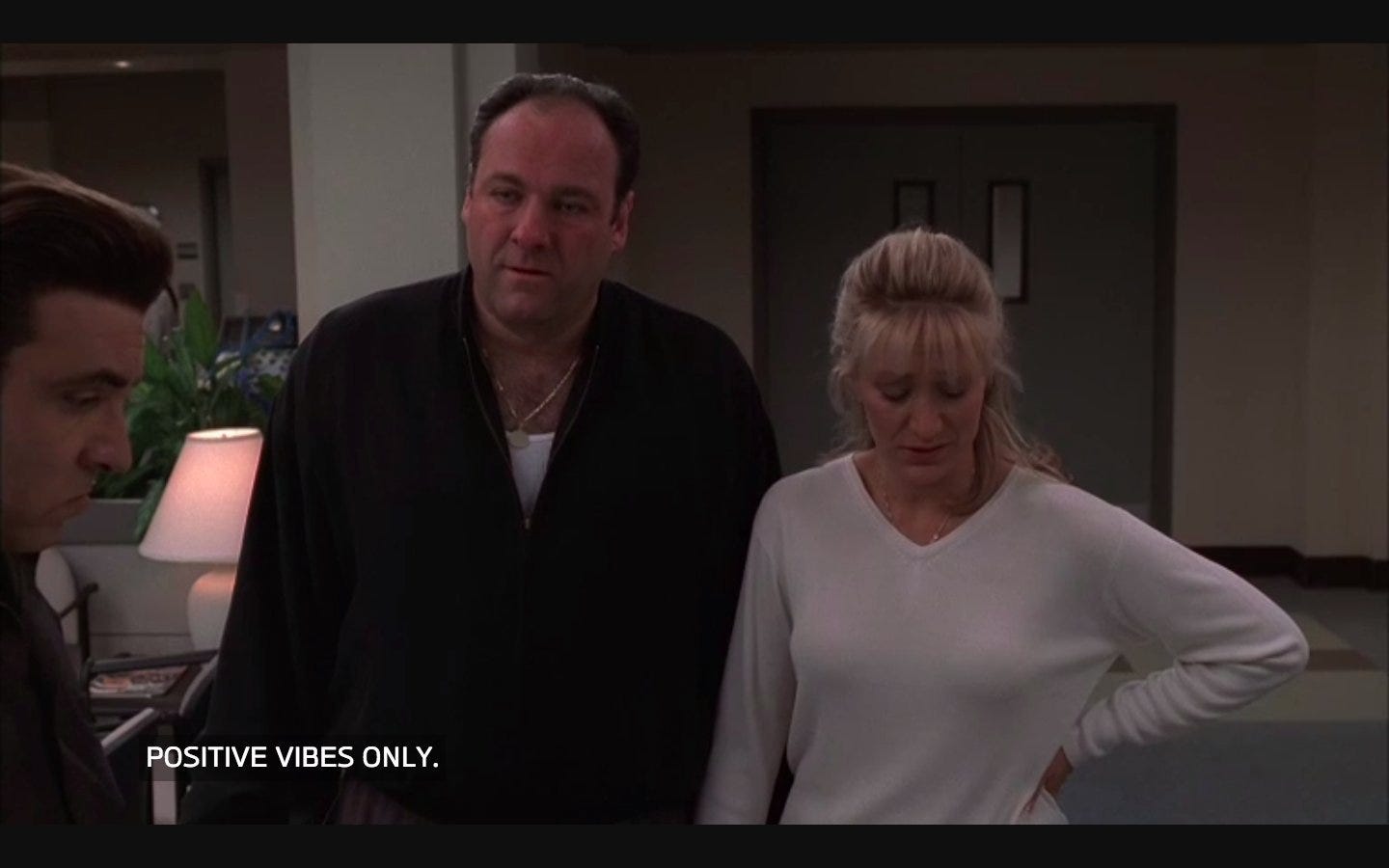22. Science Said He was Dead. Science!
“I’m supposed to get a vasectomy when this is my male heir?”

Where “Full Leather Jacket” digs into the possibility that our feelings about others are really our insecurities about ourselves, “From Where to Eternity” explores the way that our feelings about another person are often a projection of our feelings about someone else entirely — in this case, the way that people use Christopher as a vessel for their feelings about Tony. Christopher’s precarious mortality draws the comparison between him and Tony into clearer focus, and that’s exacerbated by the fact that said precarity was wrought by Richie. Everyone knows, at this point, that Richie is a threat to the established order of things, but no one can fully articulate how or why that is without feeling crazy.
There are many viable candidates, and I’m willing to hear arguments in support of all of them, but I contend that the character who’s driven most insane by all these ambiguities is Paulie. I love the relationship between Christopher and Paulie — and I think Michael Imperioli, who wrote this episode and seems to relish his scenes with Tony Sirico, does too — but I’m never quite sure what to make of it. The simplest explanation is that it’s a study in contrasts. Christopher questions everything aggressively (albeit stupidly) and has the potential to be better, and Paulie is fundamentally complacent. He doesn’t even seem to relish his work. It is what it is, and what it is is part of his routine and part of his loyalty to Tony, both of which he hinges his sense of self upon. The moments where he and Christopher converge require one of them to give, or at least be thrown off balance — and this is one of the rare moments where it’s Paulie, not Christopher, whose equilibrium ends up wrecked.
Where Paulie is thrown off by the explicit hailing of eternal damnation, Carmela jumps to that conclusion without any nudge. She’s deeply concerned about the salvation of Christopher’s — but really Tony’s — soul. So is Melfi, who’s never met Christopher and therefore gets to be far more to-the-point about it. (Worth noting, despite it being a meaningless coincidence like much of our existence: Tony’s therapy appointments are on Tuesdays at 3pm, which he just mentioned last episode; “3:00” is the entirety of the “message” that Mikey Palmice passes along to Christopher in his near-death experience; Paulie keeps waking up at 3am.)
It’s not surprising that Carm heads straight to the hospital chapel, but it is surprising that she unloads her guilt in such extensive detail while she’s there. She articulates a vision of Christopher as a version of her husband who can still be saved, and who, in being saved, might go on to save Tony too. (And the fact that The Sopranos presents redemption as a force that’s just as contagious as evil is a solid defense against accusations that it’s unrelentingly nihilistic.) I wish we’d gotten more scenes between Carmela and Christopher — after all, the Tony-Christopher connection is built on their familial bond — but I love the scene where they talk about his near-death experience. It simultaneously makes me feel like anything is possible for them both and that everything that happens from this point forward is wholly inevitable.
There’s a similar everything is possible/everything is predestined energy in the weird, blurry AJ/Tony/Christopher triangle. We know that Tony is a proxy for Christopher’s dead dad, but I think this is the first episode that really digs into Christopher as a proxy son for Tony. Tony is perpetually disappointed by AJ, but mostly as a result of his desire to shelter him from this life. In Christopher, Tony has the luxury of two sons: a professional one and a biological one. But when Carmela raises the subject of a vasectomy, she forecloses on the possibility of him having both descendants in one body and brings Tony’s anxieties about his legacy to the forefront.
Everything Tony says in his apology to AJ seems genuine and specific, while also feeling like something he wishes he could say to Christopher — and that’s amplified by the fact that, after said apology, he immediately goes to avenge his mentee/nephew-in-law. In enacting that vengeance, he brings another weird triangle into play: the Pussy/Richie/Tony dynamic, which is not so much a triangulation as it is a tangle of weird vibes and complicated history.
It’s also a perfect example of the way The Sopranos uses dramatic irony to stressful effect. It’s not that we know things the characters don’t know; it’s that we have information that would confirm their suspicions, we know they’ll get it eventually, and we have no idea what they’ll do once they have it. This season’s greatest strength is how well it executes that tension — better than any other season in the show’s run, and I think that’s what’s previously made me so quick to forgive its sloppier stretches.

